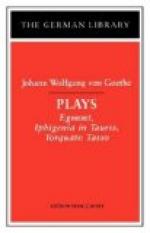|
This section contains 10,829 words (approx. 37 pages at 300 words per page) |

|
SOURCE: Larkin, Edward T. “Goethe's Egmont: Political Revolution and Personal Transformation.” Michigan Germanic Studies 17, no. 1 (spring 1991): 28-50.
In the following essay, Larkin explores the significance of political revolution in Egmont, deeming it a “means toward societal transformation and political self-determination.”
One of the central issues in Goethe's Egmont, as indicated by the author's recollection in 1825 of the revolutionary events in the Netherlands in 1786, concerns the desirability of revolution as a means toward societal transformation and political self-determination.1 One can distinguish the play's characters by their distinctive responses to the question of the legitimacy of rebellion. The most ardent proponent of the republican, pro-revolutionary stance is the aptly named Vansen (one may wonder whether Goethe had “Wahnsinn” in mind), while Philip II and his surrogate Alba remain the most staunch advocates of the prevailing centrally administered, absolutist regime. Even the regent, Margarethe von Parma, is prepared to compromise with...
|
This section contains 10,829 words (approx. 37 pages at 300 words per page) |

|


